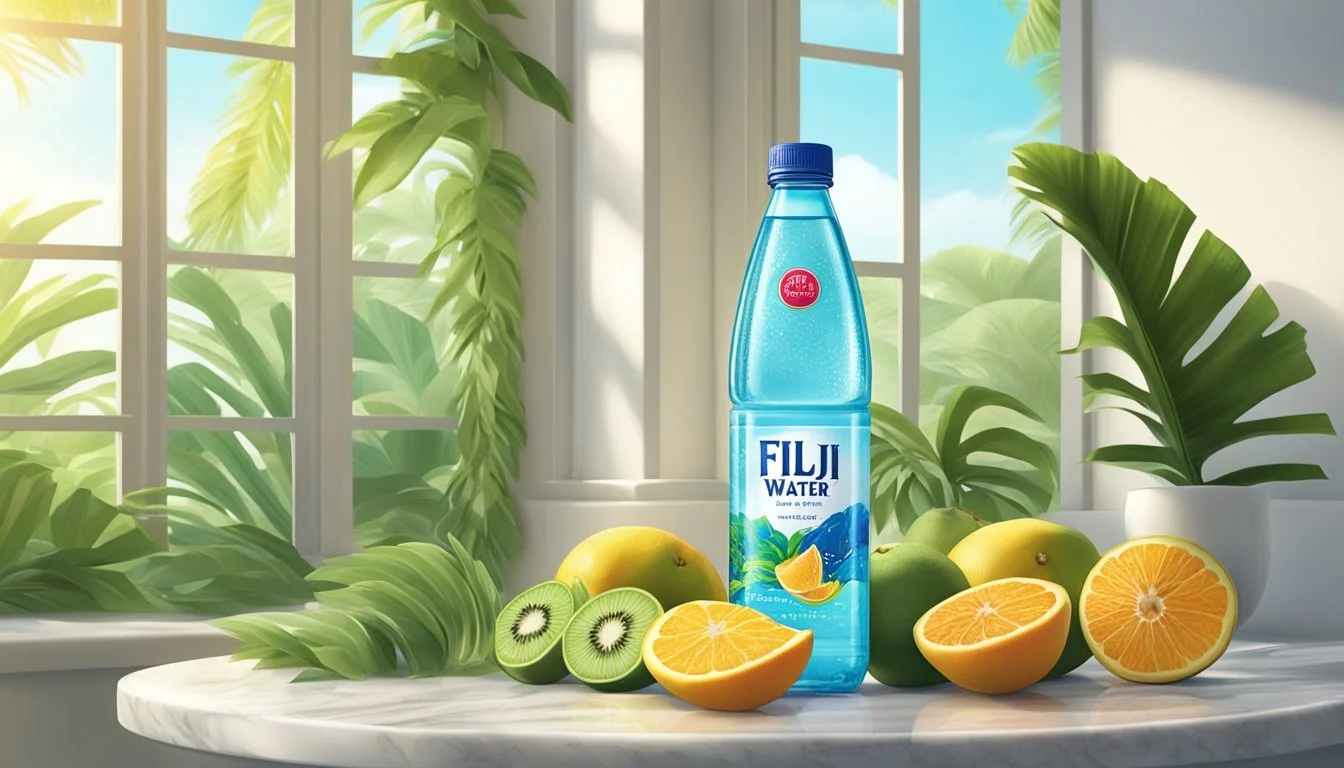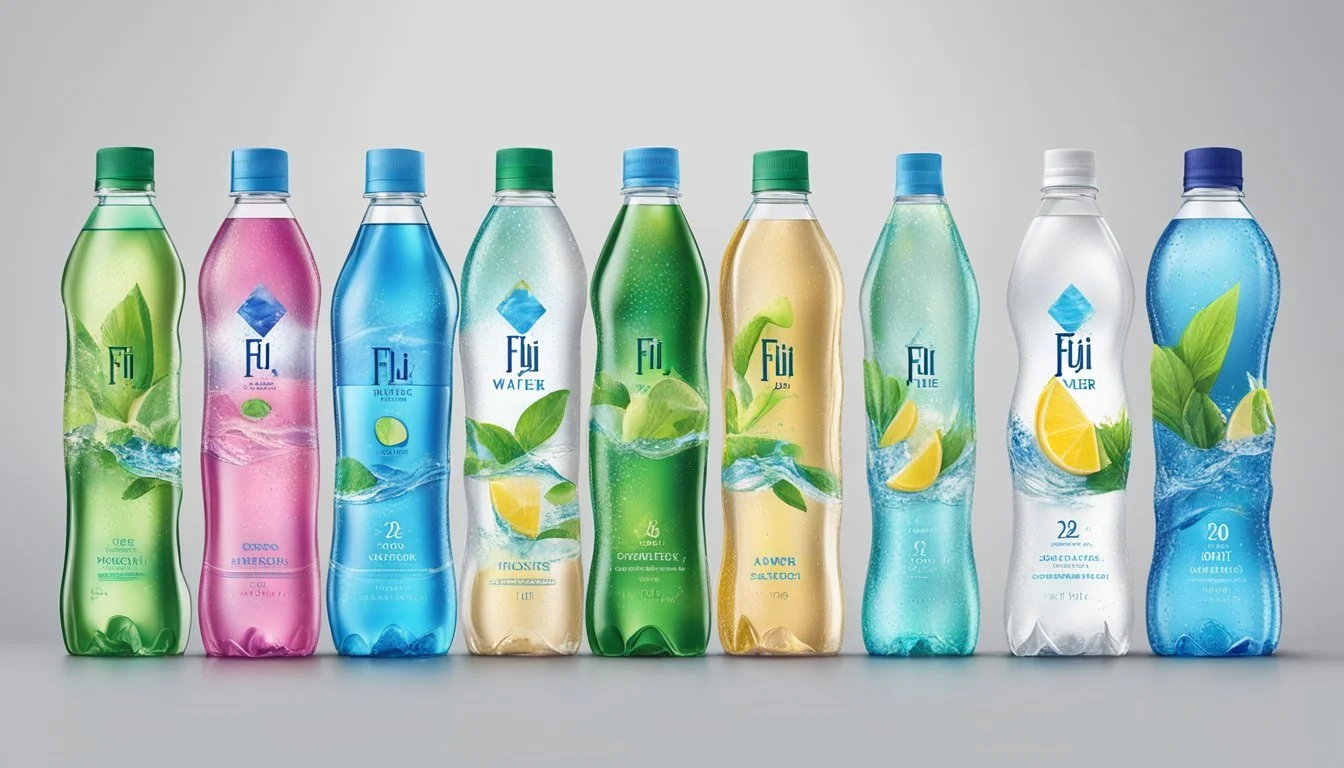Is Fiji the Best Bottled Water?
Natural Artesian Hydration from the South Pacific
Fiji Water has become a global sensation since its introduction in 1996. This premium bottled water brand sources its product from a sustainable artesian aquifer in the South Pacific island nation of Fiji. The unique mineral profile and natural filtration process give Fiji Water its distinctive smooth taste and soft mouthfeel.
The company has positioned itself as a luxury beverage, with its iconic square bottle design gracing red carpets and appearing in popular media. Fiji Water's success has made it a major export for the country of Fiji and a significant contributor to its economy.
While celebrated for its purity and taste, Fiji Water has faced scrutiny over environmental concerns and business practices. Critics have questioned the carbon footprint of shipping water across the globe and the company's tax arrangements in Fiji. Despite controversies, Fiji Water remains a popular choice for consumers seeking high-end bottled water.
History and Brand Origins
Fiji Water emerged in the 1990s, becoming a prominent premium bottled water brand. Its origins trace back to an artesian aquifer discovery on the Fijian island of Viti Levu.
Founding by David Gilmour
Canadian businessman David Gilmour founded Fiji Water in 1996. He secured a 99-year deal with the Fijian government to tap into the newly discovered aquifer.
Gilmour recognized the potential of marketing pristine water from a remote tropical paradise. He positioned Fiji Water as a luxury product, capitalizing on its exotic origins and natural purity.
The brand's distinctive square bottle design and tropical flower logo quickly set it apart in the competitive bottled water market.
Acquisition by The Wonderful Company
In 2004, Fiji Water was acquired by The Wonderful Company, a Los Angeles-based corporation owned by Stewart and Lynda Resnick.
This acquisition provided Fiji Water with increased resources and distribution capabilities. The Wonderful Company maintained the brand's premium positioning and expanded its global reach.
Under new ownership, Fiji Water's headquarters moved to Los Angeles. The company continued to source and bottle its water in Fiji, preserving its unique selling proposition.
The Wonderful Company's marketing expertise further solidified Fiji Water's status as a lifestyle brand, popular among celebrities and high-end consumers.
Source and Extraction
Fiji Water originates from a pristine source in the Yaqara Valley of Viti Levu, Fiji's largest island. The water's journey through ancient volcanic rock creates a naturally filtered, mineral-rich product bottled directly at its origin.
Yaqara Valley: The Heart of Fiji Water
The Yaqara Valley, located on the north coast of Viti Levu, serves as the exclusive source for Fiji Water. This remote tropical location is surrounded by dense rainforest and remains largely untouched by human activity.
The valley's isolation helps protect the water source from potential contaminants, ensuring its purity. Fiji Water's extraction site spans over 4,000 acres of protected land, maintaining the natural ecosystem around the aquifer.
Ancient Artesian Aquifer and Volcanic Rock Filtration
Fiji Water comes from an artesian aquifer, a confined underground water reservoir. This aquifer is naturally replenished by tropical rainfall filtered through layers of volcanic rock over hundreds of years.
The volcanic rock acts as a natural filter, removing impurities and infusing the water with silica and trace minerals. This process gives Fiji Water its distinct soft, smooth taste and mineral content.
The artesian pressure within the aquifer forces the water upward, eliminating the need for mechanical pumping. This natural pressure helps maintain the water's purity by minimizing contact with external elements.
Bottled at the Source
Fiji Water adheres to a "bottled at the source" philosophy. The water is extracted and packaged directly at its origin in the Yaqara Valley, minimizing handling and potential contamination.
The bottling facility is situated above the aquifer, allowing for a closed system from extraction to packaging. This process ensures that the water remains untouched by human hands until the bottle is opened by the consumer.
State-of-the-art bottling equipment is used to maintain the water's purity and quality throughout the packaging process. Regular testing is conducted to verify the consistency of the water's mineral content and absence of contaminants.
Composition and Quality
Fiji Water's unique composition stems from its natural artesian source in Viti Levu. The water undergoes rigorous quality control measures to ensure purity and compliance with regulatory standards.
Minerals and Electrolytes Balance
Fiji Water contains a distinctive mineral profile. It features naturally occurring silica, which gives the water its smooth taste. The water also contains calcium and magnesium, contributing to its electrolyte content.
Silica levels in Fiji Water are higher than many other bottled waters, typically around 85 mg/L. This mineral may have potential health benefits, though more research is needed.
Calcium and magnesium are present in moderate amounts. These minerals play important roles in bodily functions and can contribute to daily intake.
The electrolyte balance in Fiji Water helps maintain hydration. It provides a mix of essential minerals without being overly concentrated.
pH and Taste Profile
Fiji Water has a slightly acidic pH, typically around 6.96. This pH level is close to neutral, which is 7.0 on the pH scale.
The near-neutral pH contributes to Fiji Water's smooth, clean taste. Many consumers describe it as having a soft mouthfeel and subtle flavor.
Its taste profile is often considered refreshing and crisp. The natural mineral content enhances the overall drinking experience without imparting a strong mineral flavor.
FDA Regulation Compliance
As a bottled water product, Fiji Water must comply with U.S. Food and Drug Administration (FDA) regulations. These rules cover various aspects of production, packaging, and quality.
FDA guidelines set limits on contaminants and require regular testing. Fiji Water adheres to these standards to ensure safety for consumption.
The company must also follow FDA labeling requirements. This includes accurate representation of the water's source and any treatment processes used.
Quality Control and Testing
Fiji Water employs comprehensive quality control measures. Regular testing is conducted to verify the water's composition and purity.
Tests check for potential contaminants, including microorganisms and chemicals. The company uses both in-house and independent laboratories for these analyses.
Quality control extends to the bottling process. Strict hygiene protocols are followed to maintain the water's integrity from source to bottle.
The company also monitors the artesian aquifer source. This helps ensure long-term sustainability and consistent water quality.
Environmental Impact
FIJI Water faces scrutiny over its environmental practices. The company has implemented some sustainability initiatives but continues to grapple with concerns about its carbon footprint and plastic waste.
Sustainability Efforts
FIJI Water has transitioned its 500 mL and 330 mL bottles to 100% recycled plastic (rPET) in the United States. This change replaces nearly 70% of their U.S. bottle volume with recycled material. The shift aims to reduce plastic waste and demonstrates a commitment to more sustainable packaging.
FIJI Water sources its product from an artesian aquifer in Fiji. The company claims to protect the surrounding rainforest ecosystem. However, critics argue that the extraction process may impact local water resources.
Carbon Footprint and Recycling
The transportation of FIJI Water contributes significantly to its environmental impact. Shipping bottles from Fiji to global markets requires substantial energy and produces considerable carbon emissions.
FIJI Water's production process uses 1.75 gallons of water to create a single bottle. This inefficiency raises concerns about water waste, especially in regions facing water scarcity.
The company encourages bottle recycling but faces challenges with global recycling infrastructure. Many FIJI Water bottles still end up in landfills or oceans, contributing to plastic pollution.
FIJI Water has implemented some carbon offset programs. These efforts aim to mitigate the brand's environmental impact but do not fully address the root causes of its carbon footprint.
Social Responsibility
FIJI Water demonstrates its commitment to social responsibility through various initiatives and community support programs. The company aims to make a positive impact in Fiji and beyond.
Fiji Water Foundation Initiatives
The Fiji Water Foundation spearheads numerous projects to improve lives in Fiji. It focuses on education, healthcare, and environmental conservation. The foundation has built and renovated schools, providing better learning environments for students. It also supports medical facilities, enhancing access to healthcare services.
Environmental initiatives include reforestation efforts and marine conservation projects. These programs help protect Fiji's natural resources and biodiversity. The foundation also offers scholarships to Fijian students, enabling them to pursue higher education.
Supporting Local Communities and Infrastructure
FIJI Water invests in local infrastructure development. The company has funded road improvements, making transportation easier for rural communities. It has also supported the installation of water systems, bringing clean water to villages.
FIJI Water creates job opportunities for local residents. This employment boost contributes to economic growth in Fiji. The company also partners with local suppliers, fostering business development in the region.
Community engagement programs include cultural preservation efforts and sports sponsorships. These initiatives help maintain Fijian traditions and promote active lifestyles among youth.
Product Offerings
FIJI Water provides a range of bottled water options to meet diverse consumer needs. The brand's offerings include various sizes and packaging formats, along with its signature artesian water product.
Range of Sizes and Packaging
FIJI Water bottles come in multiple sizes to suit different occasions and preferences. The brand offers 330ml, 500ml, 1 liter, and 1.5 liter options. The 330ml size is ideal for on-the-go hydration, while the 500ml bottle serves as a popular choice for everyday use. The 1 liter bottle caters to those who require more substantial hydration throughout the day. For home or office use, FIJI Water provides a 1.5 liter bottle, perfect for ongoing hydration needs.
FIJI Water's packaging is distinctive, featuring a square bottle design with a tropical flower motif. This unique shape not only sets it apart visually but also enhances grip and portability.
Trademark Products
FIJI Water's primary product is its natural artesian water, sourced from an aquifer in the Fiji Islands. The water undergoes natural filtration through volcanic rock, which enhances it with minerals. This process results in FIJI Water's signature soft, smooth taste.
The brand emphasizes the purity and natural origin of its water. FIJI Water is bottled at the source, untouched by human hands until the consumer opens the cap. This commitment to preserving the water's natural state is a key aspect of FIJI Water's trademark product offering.
FIJI Water also provides a subscription service for home delivery, allowing customers to receive regular shipments of their preferred bottle sizes.
Market Presence and Distribution
Fiji Water has established a significant global presence through strategic distribution and marketing efforts. The brand's reach extends far beyond its Pacific island origins.
Global Reach and Availability
Fiji Water is sold in over 60 countries worldwide. Major markets include the United States, Canada, and several European nations. The brand has secured shelf space in prominent retail chains, luxury hotels, and high-end restaurants.
In the U.S., Fiji Water can be found in major supermarkets, convenience stores, and online retailers. The company has also expanded its presence in emerging markets like China and the Middle East.
Fiji Water's distinctive square bottle design helps it stand out on store shelves. This unique packaging has become a recognizable symbol of the brand globally.
Partnerships and Affiliates
Fiji Water has formed strategic partnerships to enhance its distribution network. The company collaborates with major beverage distributors in various regions to ensure wide availability.
Key partnerships include:
Airlines: Fiji Water is served on several international carriers
Hotels: Exclusive supplier for luxury hotel chains
Fitness centers: Official water partner for select gym franchises
These affiliations help position Fiji Water as a premium product and increase its visibility among target consumers.
Celebrity Endorsements and Popularity
Fiji Water has gained popularity among celebrities, which has boosted its profile. The brand is often seen at high-profile events, award shows, and film premieres.
Notable celebrity associations:
Red carpet appearances
Product placement in films and TV shows
Sponsorship of celebrity-focused charity events
This visibility has helped create a perception of Fiji Water as a luxury lifestyle brand. Social media influencers and athletes have also contributed to the brand's popularity by featuring it in their posts and endorsements.
Fiji Water's celebrity connections have solidified its status as a fashionable choice among consumers seeking a premium bottled water option.
Legal and Economic Aspects
Fiji Water faces complex legal and economic challenges in its operations. The company navigates taxation issues, revenue sharing agreements, and product safety concerns as it produces and distributes its bottled water globally.
Taxation and Revenue
Fiji Water pays taxes to the Fijian government for extracting water from local aquifers. In 2010, a dispute arose when the government proposed increasing the tax from one-third of a cent per liter to 15 cents per liter. This significant increase threatened Fiji Water's operations in the country.
The company temporarily shut down its plant in response. After negotiations, a compromise was reached, allowing Fiji Water to continue operating. The exact terms of the current tax agreement are not publicly disclosed.
Fiji Water contributes to the local economy through employment and revenue sharing. However, critics argue that the company profits disproportionately compared to the benefits received by Fiji's citizens and government.
Product Recalls and Consumer Safety
Fiji Water has faced scrutiny over product quality and safety. In 2006, the company recalled some water bottles due to concerns about manganese levels exceeding legal limits in certain U.S. states.
The recall highlighted the importance of rigorous quality control in bottled water production. Fiji Water implemented additional testing procedures to ensure compliance with regulatory standards across different markets.
Bacterial contamination is another potential risk for bottled water producers. Fiji Water's marketing emphasizes the purity of its source, but the company must maintain strict hygiene protocols throughout its bottling and distribution processes to prevent any safety issues.
Comparison to Alternatives
Fiji Water faces competition from both tap water and other mineral water brands. Its unique source and marketing position it as a premium option, though this comes with a higher price tag.
Fiji Water vs. Tap Water
Fiji Water comes from a natural artesian aquifer in Fiji, while tap water sources vary by location. Fiji Water undergoes minimal processing, retaining natural minerals. Tap water is treated to meet safety standards but may contain added chemicals like chlorine.
Fiji Water has a pH of 6.96, slightly more acidic than neutral. Tap water pH can range from 6.5 to 8.5 depending on the area.
Cost is a major difference. Fiji Water is significantly more expensive than tap water, which is nearly free. Environmental impact is another factor, as bottled water involves plastic production and transportation.
Fiji Water vs. Other Mineral Waters
Fiji Water competes with brands like Evian, Voss, and Essentia in the premium bottled water market. Each has a unique mineral profile and source.
Fiji's pH (6.96) is close to Evian's (7.07). Both are marketed as "Earth's Finest Water" from natural sources. Fiji emphasizes its artesian source, while Evian highlights its Alpine origin.
Pricing for these premium brands is generally higher than standard bottled water. Fiji often positions itself at the upper end of this range.
Taste differences are subtle. Fiji Water is known for a smooth, soft taste due to its silica content. Other mineral waters may have distinct flavors based on their mineral compositions.







